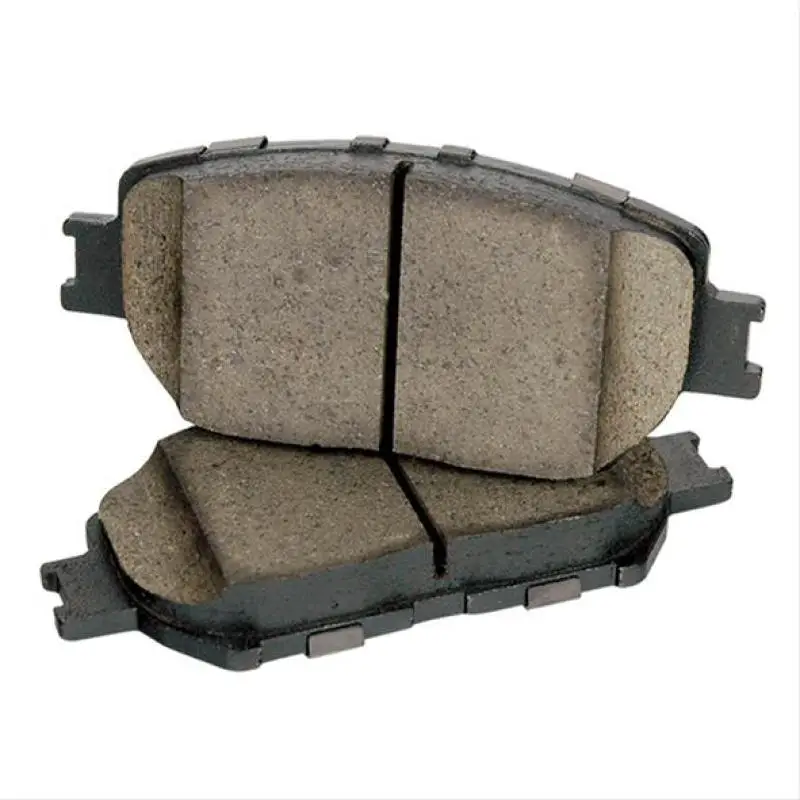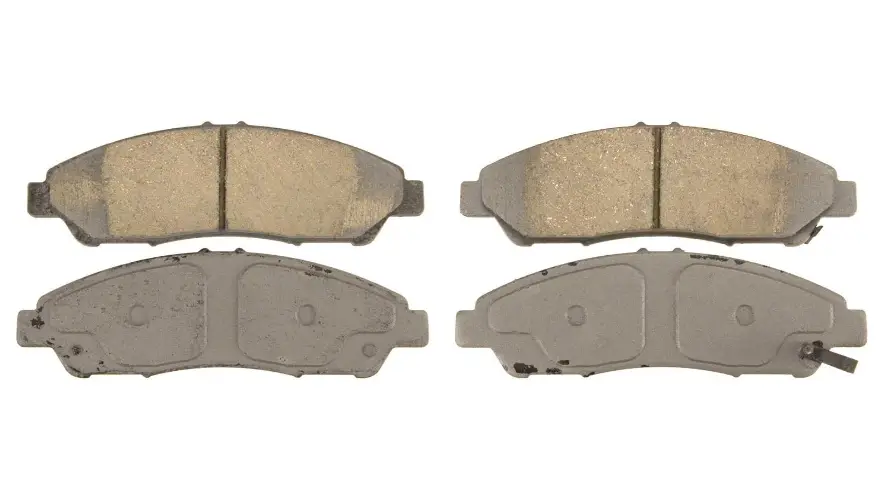Ceramic brake pads may squeak due to factors like moisture buildup, glazing from excessive heat, or accumulation of brake dust. Improper installation or worn-out pads can also cause squeaking.
Ceramic brake pads have become a popular choice for many vehicle owners due to their durability, low dust production, and quieter performance compared to other types of brake pads like metallic or organic. However, one common complaint among ceramic brake pad users is the occasional squeaking noise, which can be both irritating and concerning.
In this blog post, we’ll dive deep into the reasons why do ceramic brake pads squeak, how to identify the causes, and what you can do to prevent or resolve the issue.

Contents
What Are Ceramic Brake Pads?
Ceramic brake pads are made from a combination of ceramic fibers, bonding agents, and small amounts of metal like copper fibers. These materials provide a range of benefits, including:
- Long lifespan: Ceramic brake pads tend to last longer than their organic or metallic counterparts.
- Low dust production: Ceramic brake pads produce less brake dust, keeping wheels cleaner.
- Better performance in certain conditions: They work well at higher temperatures, maintaining effective braking power even in demanding situations.
- Quiet operation: Ceramic pads generally produce less noise compared to metallic pads.
Despite these advantages, ceramic brake pads are still prone to squeaking under certain conditions. To better understand the squeaking issue, let’s examine the main causes behind it.
Common Causes of Squeaking Ceramic Brake Pads
Squeaking ceramic brake pads can be annoying and concerning, but they are not always a sign of a serious problem. Here are some common causes of squeaking in ceramic brake pads:
1. Moisture Accumulation
One of the most common reasons ceramic brake pads squeak is due to moisture buildup. After a rainstorm, car wash, or even high humidity overnight, moisture can accumulate on the brake rotors. This thin layer of moisture can cause the ceramic brake pads to emit a squeaking sound when you apply the brakes, especially during the first few stops.
Solution: In most cases, the squeaking will disappear after a few minutes of driving and braking as the moisture burns off the rotors. If the squeaking persists, further inspection may be necessary.
2. Glazed Brake Pads or Rotors
When ceramic brake pads are exposed to excessive heat, such as during high-speed braking or frequent heavy braking, they can become “glazed.” Glazing occurs when the brake pad material hardens and develops a slick, shiny surface. This can also happen to the brake rotors.
Glazed pads or rotors reduce friction, leading to diminished braking performance and producing a high-pitched squeaking or squealing noise.
Solution: To fix this, you’ll need to have the brake pads and rotors resurfaced or replaced. Preventive measures include allowing your brakes to cool between heavy uses and avoiding continuous, aggressive braking.
3. Lack of Proper Lubrication
Brake components, such as the caliper slides and contact points, need lubrication to function smoothly. Over time, lubrication can wear away, causing the parts to rub against each other improperly, leading to squeaking sounds. This is particularly true for ceramic brake pads, which are more sensitive to changes in lubrication compared to metallic pads.
Solution: Properly lubricating brake caliper slides, pins, and pad contact points can resolve the squeaking issue. It’s important to use high-temperature brake grease that can withstand the heat generated during braking.
4. Brake Dust Accumulation
Although ceramic brake pads produce less dust than other types, they can still accumulate dust over time. When dust builds up on the brake rotors or calipers, it can interfere with the normal operation of the brake system and cause squeaking or grinding noises.
Solution: Regularly cleaning the brake components, including the calipers and rotors, can prevent dust buildup. Using a brake cleaner and a soft brush can help remove dust without damaging the components.
5. Improper Installation
Sometimes, squeaking brake pads are the result of improper installation. If the brake pads are not correctly aligned or if anti-rattle clips, shims, or other hardware are missing or incorrectly installed, the brake pads may vibrate, leading to squeaking sounds.
Solution: Ensuring that brake pads are installed correctly with all the necessary hardware is crucial. If you hear squeaking after a brake pad replacement, it might be worth having a professional check to see if the installation was done properly.
6. Worn-Out Pads or Rotors
Even though ceramic brake pads are durable, they still wear out over time. When brake pads become too thin, they can cause squeaking noises as they make metal-to-metal contact with the rotors. Additionally, worn-out or unevenly worn rotors can cause similar squeaking sounds.
Solution: Regularly check your brake pads for wear. If they’ve worn down to the manufacturer’s minimum thickness, they should be replaced. Worn-out rotors may need to be resurfaced or replaced entirely.
7. Cold Weather
Cold weather can cause brake components to contract, which can affect the performance of ceramic brake pads. In colder temperatures, the materials in ceramic brake pads can become less pliable, resulting in squeaking sounds during the first few applications of the brakes.
Solution: Allow the brakes to warm up during the first few minutes of driving. The squeaking should go away as the brakes reach their normal operating temperature.

How to Prevent Ceramic Brake Pads from Squeaking
While some causes of squeaking may be unavoidable, such as weather conditions, there are several steps you can take to prevent ceramic brake pads from squeaking:
- Choose Quality Pads and Rotors: Investing in high-quality ceramic brake pads and rotors will reduce the likelihood of glazing or squeaking.
- Break in the Brake Pads Properly: After installing new brake pads, it’s important to bed or break them in correctly by following the manufacturer’s guidelines. This process helps evenly distribute the brake pad material on the rotor, preventing premature glazing and squeaking.
- Regular Brake Maintenance: Routine brake inspections, cleaning, and lubrication are essential to keeping your brake system functioning smoothly. Check for worn pads and rotors and clean brake dust regularly.
- Avoid Aggressive Braking: Allow the brakes to cool between heavy uses, and avoid braking harshly unless necessary. Continuous aggressive braking can overheat and glaze the brake pads and rotors.
When Squeaking Is a Sign of a Bigger Problem
While occasional squeaking can be harmless, there are instances where it can indicate a more serious issue with your brake system. If you notice any of the following, it’s best to have your brakes inspected by a professional:
- Consistent, loud squeaking or grinding that doesn’t go away.
- Reduced braking performance or longer stopping distances.
- Vibration in the brake pedal or steering wheel when applying the brakes.
- Visible wear on the brake pads or rotors.
Ignoring these signs can lead to more significant problems, including brake failure, which could compromise your safety on the road.
Frequently Asked Questions
Here are some FAQs about ceramic brake pads squeaking –
1. Is it normal for ceramic brake pads to squeak?
Yes, it’s common for ceramic brake pads to squeak under certain conditions, such as during initial use after moisture exposure or cold weather. However, persistent squeaking may indicate an underlying issue that needs to be addressed.
2. Can I stop ceramic brake pads from squeaking?
Yes, squeaking can often be prevented or reduced by properly bedding in the brake pads, ensuring correct installation, and maintaining the brake system through regular cleaning and lubrication.
3. Do ceramic brake pads squeak more than metallic pads?
Ceramic brake pads are generally quieter than metallic pads, but they can still squeak under certain conditions like moisture, dust buildup, or improper installation. Metallic pads tend to squeak more, especially in colder temperatures.
4. Are squeaking ceramic brake pads dangerous?
Squeaking isn’t always a sign of danger, but if it’s persistent or accompanied by reduced braking performance, it could indicate worn-out pads, glazed rotors, or other issues that need attention.
5. How often should ceramic brake pads be replaced?
Ceramic brake pads usually last longer than metallic or organic pads and may need to be replaced every 30,000 to 70,000 miles, depending on your driving habits and conditions. Regular inspections can help determine when a replacement is necessary.
Conclusion
Ceramic brake pads offer many benefits, including durability, cleaner operation, and quieter performance, but they can still squeak for various reasons. Understanding the causes, such as moisture, glazing, dust buildup, and improper installation, can help you address and prevent squeaking. Regular maintenance, proper installation, and using high-quality parts can go a long way in keeping your brakes quiet and efficient.
If your ceramic brake pads are squeaking persistently, it’s essential to diagnose and resolve the issue before it leads to more significant problems with your braking system.